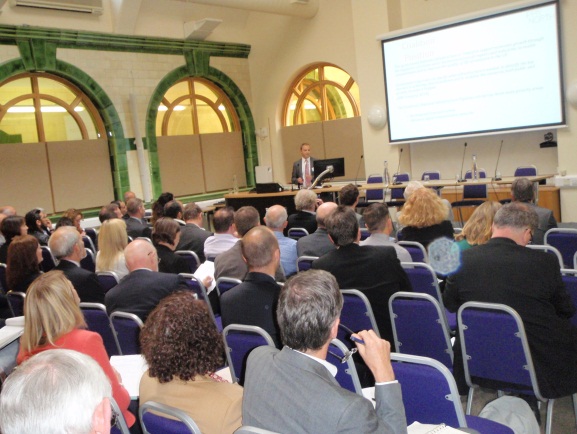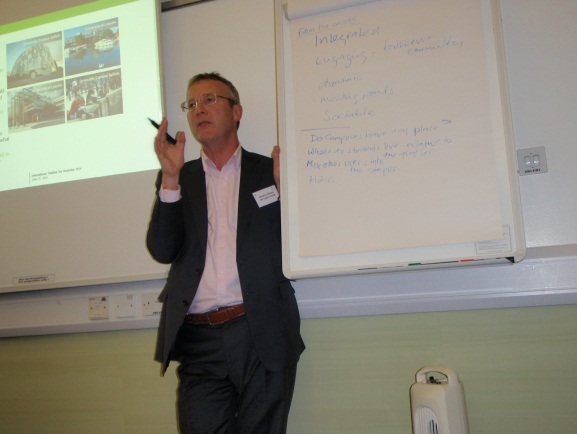Business Planning for City & Regional Innovation

Framing the Future – Business Planning for City and Regional Innovation Conference
During June and July, Liverpool was the location for the International Festival for Business and the role of planning in “framing the future” featured in a one day conference Business Planning for City and Regional Innovation hosted by the Department for Geography and Planning at the University of Liverpool on 27 June.
With the widening gap in economic performance between London and other parts of the UK very much in the news, the event brought together planning, business and higher education communities to explore how they could collaborate to address this issue. Held in the Foresight Centre at the University, the programme of speakers and workshops enabled delegates to learn about best practice related to Neighbourhood Planning for Business, Knowledge and Innovation Quarters and Transformational Infrastructure.

The event also formed a contribution to the Royal Town Planning Institute’s Centenary Celebrations and the Chief Executive, Trudi Elliott, gave a keynote address at the evening Reception held in the University Chapel [Beverley – key RTPI messages to be added here]. The Reception also featured a talk by Professor Peter Batey, Lever Professor of Planning, on the important role played by the City and the North West in the development of planning as a profession. The University established the world’s first planning school, the Department of Civic Design, in 1909, with an endowment from Lord Leverhulme and former luminaries included Sir Patrick Abercrombie and Gordon Stephenson. Whilst reflecting on this heritage, the day’s events were focused on the future with a full programme related to the following three themes:
Neighbourhood Planning for Business
Under the provisions of the Localism Act, numerous Neighbourhood Plans are being prepared by local communities. This theme considered the scope for the establishment of forums comprising business interests to prepare Business Neighbourhood Plans. Tim Hayward of the Department for Communities and Local Government, together with David Waterhouse of their advisors, Cabe, and the Design Council, set the scene describing the format of these new plans and progress to date nationwide. David Lock, who has first-hand experience of one of the first plans to emerge in Central Milton Keynes gave a critical assessment of the process, its successes and areas for improvement. Maresa Molloy explained her role in working with local companies to progress the emerging Business Neighbourhood Plan for the Liverpool Innovation Park at Wavertree.
Knowledge and Innovation Quarters
Recognised at a strategic level as a major factor in economic growth, this theme considered how Knowledge and Innovation could support regeneration initiatives in emerging Quarters of excellence. Professor Michael Parkinson of the University of Liverpool summarised the results of his research comparing the performance of cities across Europe and the key ingredient for prosperity. Jane Healey Brown of Arup considered the lessons that could be drawn in respect of Enterprise Zones, both from the 1980s and the more recent examples. Stephen Gleave of IBI Taylor Young looked at case studies of successful Education Quarters.
Transformational Infrastructure
The importance of major infrastructure development is recognised in the planning system and in economic policy. This theme considered how they could be integrated at both national and local levels. Contributors included Dave Trimingham of Turley and Graham Russell of Amion, who shared their wide experience of major schemes, including the new port development, Liverpool2. The importance of green infrastructure was considered in a case study of Atlantic Gateway Parklands led by Iain Taylor of the Peel Group. Ed Cox provided an update on the work being carried out by IPPR North, examining the north-south disparity in infrastructure spending, work which has subsequently been published in their recent report, Transformational Infrastructure for the North: Why We Need a Great North Plan.
Thanks also go to Richard Tracey of Liverpool Vision, who welcomed delegates on behalf of IFB 2014; Sue Kidd, Head of Planning in the Department of Geography and Planning, who introduced the Conference and made the concluding remarks; and Jim Hancock, who chaired the event and marshalled the question sessions. The Visiting Professors in the Department, Ian Wray, Walter Menzies and Peter Nears, who helped to organise the day, would like to thank all the contributors; the sponsors, Turley, Arup, Amion, Peel and IBI Taylor Young - and the RTPI for promoting it as a Centenary event. With the International Festival for Business widely regarded as a success, reflected in the announcement by the Government of future funding for IFB, plans are already underway for further Framing the Future events, hopefully culminating in a repeat conference in 2016.